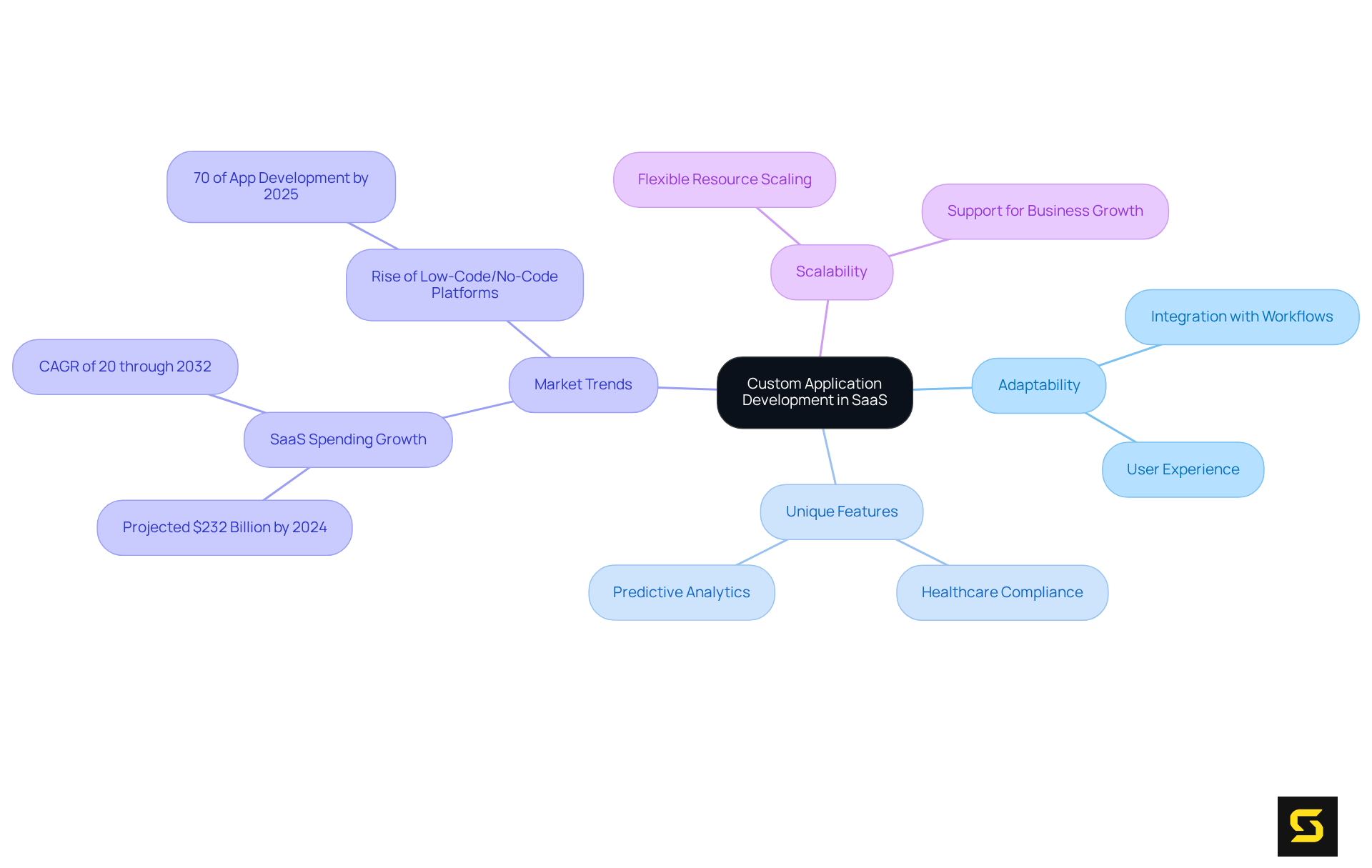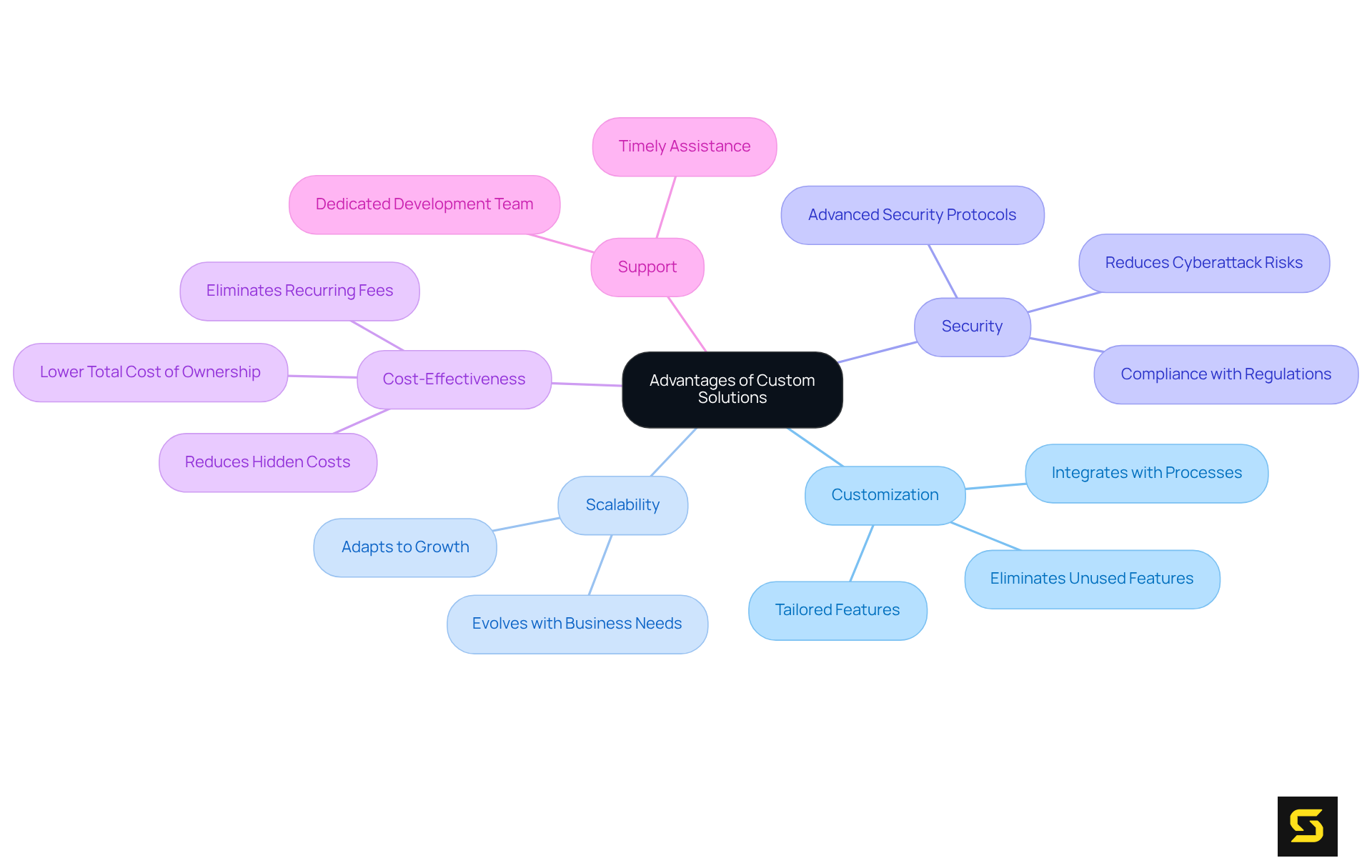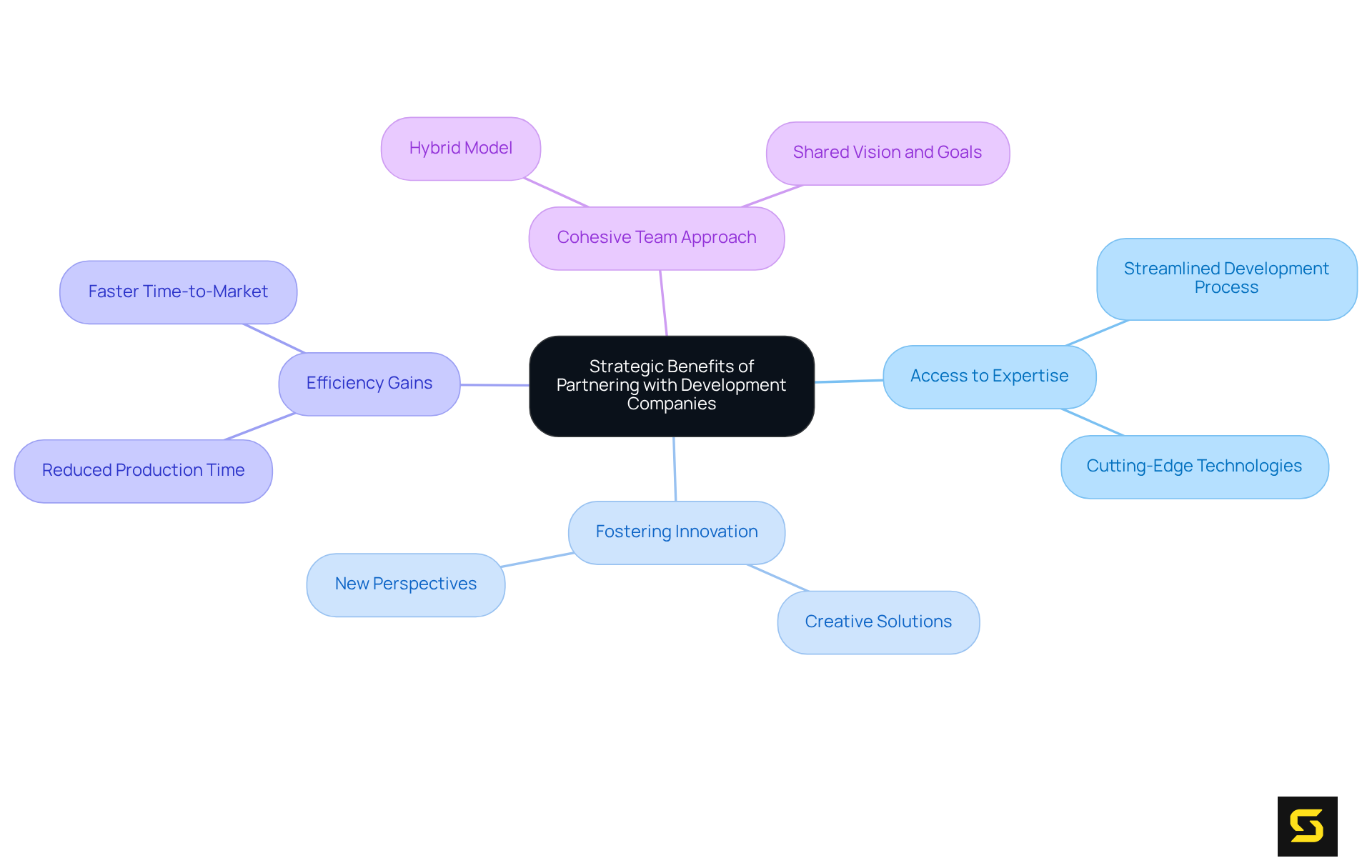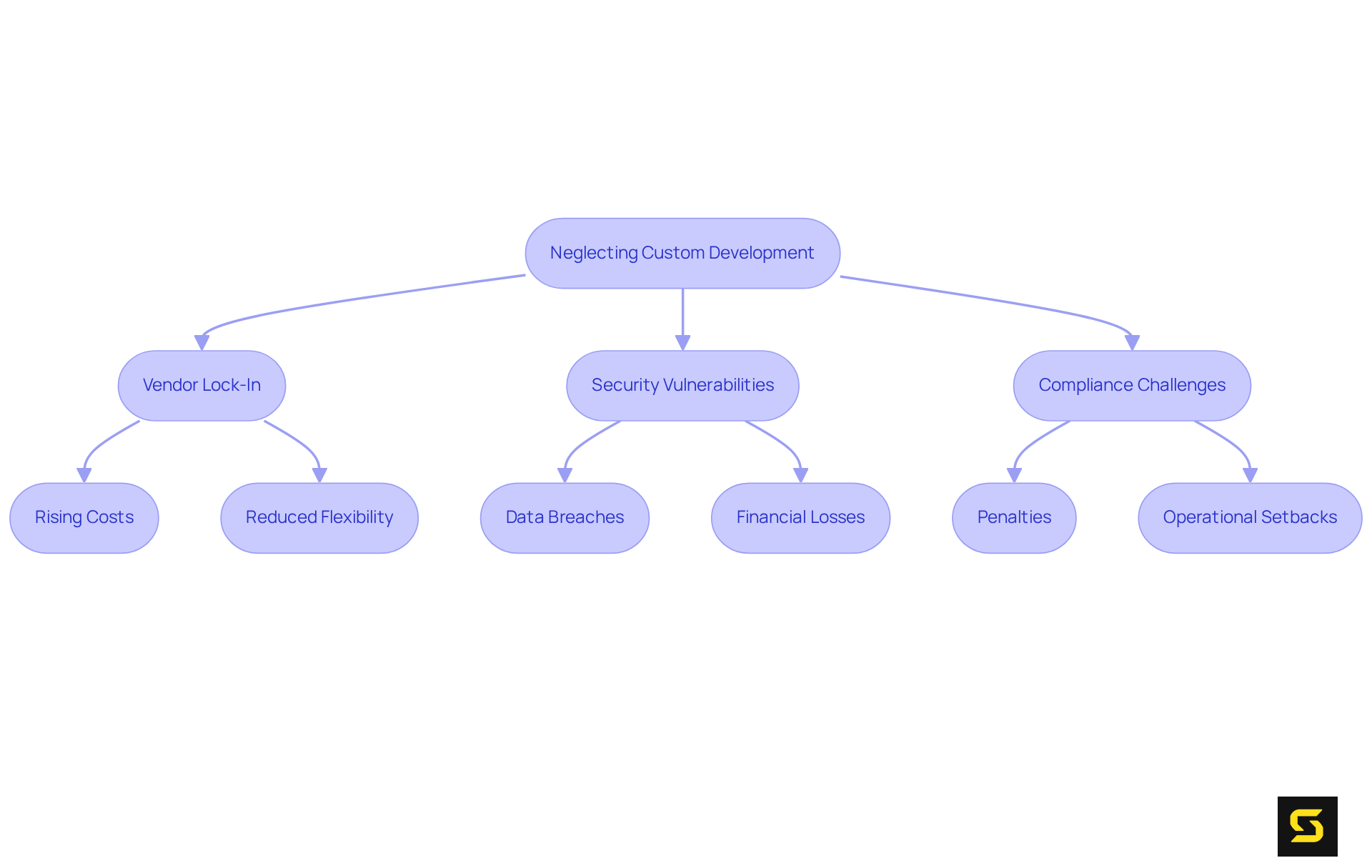Overview
Selecting a custom application development company is pivotal for achieving success in the SaaS landscape. This choice empowers organizations to develop tailored solutions that not only meet their specific operational requirements but also significantly enhance user experience. Custom development provides essential flexibility and scalability, alongside the integration of unique features and advanced security measures. These elements are crucial for maintaining competitiveness and ensuring compliance in a market that is constantly evolving.
Introduction
The landscape of Software as a Service (SaaS) is rapidly evolving, compelling businesses to seek innovative solutions to maintain competitiveness. Custom application development stands out as a pivotal strategy, enabling organizations to craft tailored software that aligns seamlessly with their distinct operational needs.
As the demand for personalized applications escalates, a critical question emerges: what are the genuine risks and rewards of choosing custom development over off-the-shelf solutions? Grasping this dynamic not only illuminates the path to SaaS success but also unveils how strategic partnerships with development companies can significantly enhance operational efficiency and user experience.
Understand the Critical Role of Custom Application Development in SaaS
The custom application development company is pivotal to the success of Software as a Service (SaaS), enabling organizations to craft solutions that are precisely tailored to their operational needs and user expectations. Unlike off-the-shelf software, which often compels organizations to modify their processes to align with the software, a custom application development company can develop that facilitate a seamless integration of business workflows and technology. This adaptability is essential in a competitive landscape where user experience and operational efficiency are critical.
Furthermore, tailored creation allows for the integration of unique features that can distinguish a SaaS product in the marketplace, ultimately enhancing user engagement and satisfaction. For instance, a healthcare SaaS platform can be developed to comply with specific regulatory standards while simultaneously enhancing patient care through customized features, underscoring the direct benefits of personalized creation in specialized sectors.
Additionally, with SaaS spending projected to rise by 17.7%, reaching $232 billion in 2024, the demand for services from a custom application development company is increasing. By 2025, low-code and no-code platforms are anticipated to account for 70% of app creation, making custom solutions more accessible than ever. Scalability remains a crucial aspect of SaaS development, ensuring that applications can grow in tandem with organizational needs.

Explore the Advantages of Custom Solutions Over Off-the-Shelf Software
Tailored offerings present significant advantages over ready-made applications, making them an attractive option for companies focused on growth and operational efficiency. A primary benefit lies in the ability to customize features and functionalities to meet specific organizational needs, ensuring that the application integrates smoothly with company processes. This level of customization not only enhances productivity but also reduces operational friction.
Moreover, tailored solutions offer substantial flexibility in scalability; as an enterprise expands, its applications can evolve without the limitations often associated with off-the-shelf products. For instance, a fitness company may require specialized tracking features that generic applications simply cannot provide.
Additionally, custom solutions typically incorporate advanced security measures tailored to the organization's specific requirements, thereby minimizing the risk of data breaches and ensuring compliance with industry regulations. This is particularly vital in sectors like healthcare, where data sensitivity is critical.
Furthermore, off-the-shelf applications frequently come with hidden costs, such as licensing fees and the need for third-party tools, which can accumulate over time and erode potential savings. In contrast, a custom application development company offers dedicated support from the development team, ensuring prompt assistance and smoother operations for businesses.
Statistics indicate that tailored applications can reduce cyberattack risks by as much as 25% compared to commonly used packaged options, underscoring the importance of personalized solutions in safeguarding sensitive information. A compelling example is Żabka's innovative food waste reduction feature, which illustrates how custom software can effectively address unique operational needs that off-the-shelf solutions may overlook.

Leverage Expertise: The Strategic Benefits of Partnering with Development Companies
Partnering with a reputable custom application development company offers significant strategic advantages that can drive a SaaS project toward success. These firms act as a custom application development company, bringing specialized knowledge and experience to streamline the development process and guarantee timely and budget-conscious project completion. Access to cutting-edge technologies and modern practices enhances the quality and performance of the final product.
For instance, a collaborative partner can guide a startup through the complexities of building a scalable SaaS application, leveraging their expertise to sidestep common pitfalls and expedite time-to-market. Moreover, these partnerships foster innovation, as a custom application development company introduces fresh perspectives and creative solutions that internal teams may overlook. This collaborative approach not only elevates the product but also allows companies to , delegating technical challenges to seasoned professionals.
Industry leaders assert that successful companies regard outsourcing not merely as a cost-saving tactic but as a strategic lever for boosting competitiveness and driving growth, much like a custom application development company would. By integrating external expertise, SaaS businesses can achieve quicker product launches, enhanced operational efficiency, and ultimately, a more robust market position. Notably, companies can reduce production time by 50% when engaging with external partners, underscoring the value of these collaborations.
Additionally, treating external partners as extensions of the internal team cultivates a more cohesive approach, which is vital for maximizing the advantages of such partnerships. The hybrid model, which combines internal strategic roles with external specialized execution, further improves flexibility and responsiveness in the development process. A prime example of effective strategic partnerships is Netflix, which attained streaming success by collaborating with specialized teams, enabling its core team to focus on enhancing user experience.

Assess the Risks of Neglecting Custom Development in SaaS
Neglecting the services of a custom application development company in the SaaS landscape exposes businesses to significant risks that can impede growth and operational efficiency. A primary concern is vendor lock-in, where organizations become excessively dependent on a single provider, often resulting in rising costs and reduced flexibility. This dependency obstructs a company's capacity to adapt its systems to changing market needs or technological advancements. For instance, studies indicate that 83% of organizations have experienced multiple data breaches, with the average cost of a data breach now reaching $4.45 million USD. This underscores the that fail to meet specific organizational requirements.
Off-the-shelf applications frequently lack the tailored functionalities essential for unique business processes, leading to inefficiencies and user frustration. In the healthcare sector, for example, companies may face compliance challenges if their applications do not align with industry-specific regulations, as illustrated by case studies on compliance gaps in SaaS platforms. Such misalignment can result in costly penalties and operational setbacks. Moreover, the inability to customize applications can expose organizations to security risks, as generic solutions often lack the robust protections necessary for safeguarding sensitive information.
The consequences of vendor lock-in are further exemplified by incidents where organizations have suffered significant downtime and financial losses due to their reliance on a single vendor's platform. These scenarios highlight the critical importance of investing in a custom application development company, ensuring that SaaS offerings are effective and resilient in a constantly evolving commercial landscape. By prioritizing customized applications, organizations can maintain control over their operations, enhance security, and ultimately drive sustainable growth through a custom application development company. Additionally, organizations should proactively build exit strategies and review SLAs to mitigate vendor lock-in risks. As noted by Alchemy, custom software solutions empower businesses to treat cybersecurity as an investment rather than a cost, reinforcing the strategic significance of investing in bespoke development.

Conclusion
The significance of selecting a custom application development company for SaaS success is paramount. Tailoring software solutions to meet specific business needs not only enhances operational efficiency but also fosters a competitive edge in an increasingly crowded market. By opting for custom development, organizations can ensure that their applications align seamlessly with their workflows, ultimately leading to improved user satisfaction and engagement.
Throughout this discussion, the advantages of custom solutions over off-the-shelf software have been underscored. Custom applications offer unparalleled flexibility, allowing businesses to scale their solutions as they expand. They also provide enhanced security measures tailored to specific industry requirements, significantly reducing the risks associated with data breaches. Furthermore, partnering with experienced development companies brings invaluable expertise that can streamline the development process and drive innovation, positioning companies for long-term success.
In a landscape where SaaS spending is on the rise, the risks of neglecting custom development are considerable. Organizations that rely solely on generic solutions may encounter:
- Vendor lock-in
- Compliance issues
- Operational inefficiencies
By investing in bespoke application development, businesses can maintain control over their software, enhance security, and adapt to evolving market demands. Embracing custom solutions is not merely a strategic advantage; it is essential for sustaining growth and achieving lasting success in the SaaS industry.
Frequently Asked Questions
What is the role of custom application development in SaaS?
Custom application development is essential for the success of Software as a Service (SaaS) as it allows organizations to create solutions tailored to their specific operational needs and user expectations, facilitating a seamless integration of business workflows and technology.
How does custom application development differ from off-the-shelf software?
Unlike off-the-shelf software, which often requires organizations to alter their processes to fit the software, custom application development enables the creation of applications that align with existing workflows and enhance operational efficiency.
What are the benefits of tailored application creation in SaaS?
Tailored application creation allows for the integration of unique features that can differentiate a SaaS product in the market, enhancing user engagement and satisfaction. For example, a healthcare SaaS platform can be customized to meet specific regulatory standards while improving patient care.
What is the projected growth of SaaS spending?
SaaS spending is projected to rise by 17.7%, reaching $232 billion in 2024, indicating an increasing demand for services from custom application development companies.
What trends are expected in app creation by 2025?
By 2025, it is anticipated that low-code and no-code platforms will account for 70% of app creation, making custom solutions more accessible to organizations.
Why is scalability important in SaaS development?
Scalability is crucial in SaaS development because it ensures that applications can grow and evolve alongside the changing needs of an organization.





